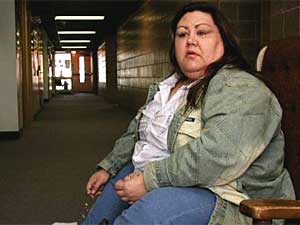|
Photos
|
March 24, 2005
 |
| Ruthan Donell waits for help with driving expenses to meet with family and friends in Red Lake. (MPR Photo/Art Hughes) |
Minneapolis, Minn. — The Red Lake band of Ojibwe are well represented in the mixed-tribe population of the Little Earth United Tribes housing complex in south Minneapolis. Little Earth Director Bill Ziegler said since the first reports of the shooting, the tight-knit community has struggled to recover.
"I knew we had, at a minimum, 12 households that were directly affected by the tragedy," Ziegler said. "It was their family members involved that lost their lives. I knew that the families would need to get home and just wouldn't have the means to do it."
The Red Lake Reservation has about 10,000 enrolled members. Less than half of those live on the reservation. Many others live at Little Earth and elsewhere in the Twin Cities.
In addition to expressions of need by family members, Ziegler is also receiving offers of help. He's trying to coordinate donations of money, services and other goods to make sure those Little Earth residents who want to return to the reservation can do so.
Travis Zimmerman, co-chair of the Metropolitan Urban Indian Directors, said the high profile tragedy has prompted an outpouring of outside support for the victims and their families. But he says many of the efforts haven't reached the enclave of city-dwellers.
"A lot of those more specific to the needs of the reservation," Zimmerman said. "And there's just right now a disconnect to helping out the urban population by those family members and those people affected by it in the urban areas that want to go home and be part of that process and to be able to heal and pay their last respects to loved ones."
He said the inability to plan for such an unfathomable and sudden tragedy and the high rate of poverty among Minneapolis Indian residents compounds the problem.
The All Nations Church in Minneapolis has become a sanctuary for mourning and a place where Red Lake band members can get financial help to return home. The smell of burning sage lingers in the air of the church. The woody branches of sage -- used in an Indian spiritual cleansing ceremony -- are given to people as they arrive.
Arlene Downwind-White of the Red Lake Urban Office is arranging pre-paid gas cards for those driving. She said extended family and fellowship play a big part in Indian culture.
"In times of hardship and tragedy there is nothing that will beat getting a hug from a family member and standing with them in times of need, and that's what we're here for today," she said.
Leaders said they expect dozens of Indian Twin Cities residents to go to Red Lake for various ceremonies and memorial services.
Among those both seeking, and offering comfort is Ruthann Donell. Derrick Brun, the school security guard shot and killed at Red Lake High School, was Donell's cousin. She has trouble reconciling his violent death with the peaceful person she's known since she was 12.
"Thinking of my little cousin when he was a little baby and seeing him grow up," she said. "And seeing how much of a great guy he really was. And he really was the greatest guy."
Like many band members here, her connections to the shooting spread out like a web to include friends and acquaintances. Her foster child's cousin is among those killed. Another friend's child struggles with the memory of fleeing the school and seeing a relative's lifeless body.
"It's really unbelievable," Donell said. "And being here so far away, it just hasn't hit home yet. But I'm sure once we hit the boundary lines it'll hit."
Donell hasn't lived on the reservation for years, but gets back every few months. She said the gas money will help her out so she can help others.
"If there's anything we can do as far as helping with anything for the wake and the funeral," she said. "We all have to pull together and help each other. And that's what we do."
Those coordinating efforts in the Twin Cities say anything left over from the donations will stay in a fund to continue helping urban Indians in need, to travel to wherever they want to go to reconnect with their families.






